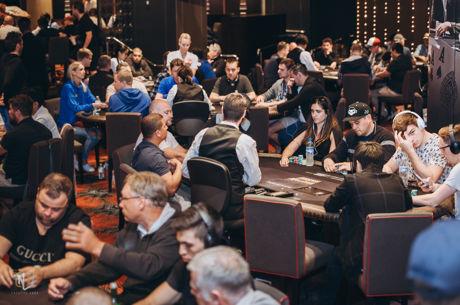Six Key Steps for Practicing Better Poker Game Selection

There are literally thousands of articles about improving your skills at the poker table. But I'd like to discuss a different skill that is less often considered. Instead of addressing what you do at the table, I want to talk about finding the right table.
Here are six steps you can take in the right direction.
1. List all your options
Online Poker
Before you pick a place to play poker online, you need to consider all of the playing options you have. Where can you play online from your location? What reliable sites are there that are available to you? You want a site that is well regarded when it comes to timely payouts, has good customer service, offers a reasonable rake, and features games and stakes that fit your budget and interests.
One place to start is right here with PokerNews' guide to online poker rooms.
Public Poker Rooms
How far are you willing to travel to play in a public poker room? What rooms are within that radius? Are there any regularly scheduled private games where you might play?
These should all be listed, with an indication of the respective games (tournament and cash), stakes, rakes, number of tables, hours of operation, and promotions.
Home Games
This used to be, by far, the number one option for poker players — games played in someone's home, office, or club. With the explosion of public poker rooms and online poker, home games are less common today. But if the public poker rooms around you are raked too stiffly or filled with too many grinders or otherwise skilled poker players, playing in a home game might be your best option.
Keep in mind that there are also large differences among home games. You'll need to ask around among others who play poker to see what's available. I also recommend that you visit and play in as many of these games as you can to draw your own conclusions. You may also want to think of organizing your own home game.
I've written a number of articles on finding home games, organizing them yourself, and how to succeed in them — here are a few:
- "Eight Tips for Finding a Game"
- "Five Ingredients for Organizing and Hosting a Poker Game"
- "Getting Invited Back to the Game"
- "Deciding on a Good Betting Structure"
- "Five Winning Strategies to Succeed in Home Games"
2. Canvas those you know and ask about the rooms
You may have already done this, and know the rundown of all of the poker rooms within driving range. If you haven't, or if it's been a while, keep in mind that the character of a poker room often changes quickly.
Sometimes a room which was once "the place to play" falls out of favor, while others with previously poor reputations turn things around with new management. Make sure to find out what you can about the relative quality of the current games by asking people you know for their opinions.
Read online reviews with a critical eye, as these can often be manipulated by the promotors or operators of specific sites or rooms. But if you are a regular poker player, you will know people who will have useful insight into these games. Ask them what they think. Keep track of what you find.
3. Play in the available rooms and make your own judgment
Nothing can substitute for your own opinion of the poker rooms. That means you really need to visit them if you can. Here's a checklist of questions for which you'll want answers as you rate the rooms:
- What is the rake and how is it taken?
- How much money is on the tables in the room? If many players are playing short stacks, you may not win very much even if you're much more skilled. Your advantage may be gobbled up by the rake — often a much higher percentage of your winnings in a small game than in a large game.
- What denomination of chips tend to be used in the game you want? I well recall playing in some $1/$2 games where players only had white $1 chips. That told me the games were tight affairs relative to games with players stacking in with $5 and $25 chips where the action would normally be bigger and the rake would tend to take smaller bite out of my profit. Low denomination chips generally indicate a less favorable game, though not always.
- What do you observe about the quality of the play? Are there a bunch of nits? Are there lots of wild aggressive players? Do you meet players who make their living playing in the room? Are there drinking fun-loving tourists, grinding regulars, clueless newbies? The key is that you want players who offer you the best opportunity for making money.
- What promotions are offered and when do they offer them? Some rooms become wild, loose, highly profitable affairs when there's a special promotion going on. Other rooms get busy only at night or on the weekends. Some have only one or two nights during the week when certain games are spread. Make sure you know this so you can plan your visits accordingly.
4. Keep track of your observations
Obviously, this will be a judgment call. Your evaluation of one trait may conflict with your observations of the other trait. You might conclude that Room A has a bunch of fish who are playing tiny stacks while Room B has a bunch of serious players playing deep stacks.
It's good to know in advance which will be the most profitable room for you. However, in order to determine which room will be the most profitable, you need to have a good idea of the type of room you'll be playing in and its chief characteristics. The fact that you're thinking about these factors when making your decision about where to play is the key ingredient here.
5. Keep track of your playing sessions and how you did
While visiting a room will provide you with useful observations, your personal data may be revealing as well. If you win $4,500 over 200 hours on weekend nights in one room and only $500 in another during the same time of day, chances are that the first place is a better place to play.
6. Recognize that some tables within the same room may be of vastly different quality
Make sure to keep your eye out for the best game in a room (and not just the best room). In general, the best games have big stacks and loose passive players. You also want to scout around for signs of loose gambling — i.e., Keno slips, race track forms, and the like.
You may do better in other types of games, however, so consider your own individual playing preferences as well. Then scout out the best table for you in your best room. Don't fall victim to lead-seat syndrome.
Conclusion
Of course even if you find the best seat at the best table in the best room you can find, there is no guarantee that you will beat the game. But you give yourself a much better chance of finishing ahead if you seek out, find, and play in the best game possible.
Ashley Adams has been playing poker for 50 years and writing about it since 2000. He is the author of hundreds of articles and two books, Winning 7-Card Stud (Kensington 2003) and Winning No-Limit Hold'em (Lighthouse 2012). He is also the host of poker radio show House of Cards. See for broadcast times, stations, and podcasts.









